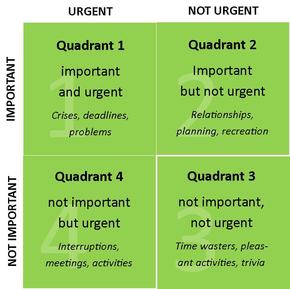 In ministry our biggest enemy isn't a grumpy Deacon or a contentious committee meeting. Our enemy is a big, ugly, giant, two-headed monster: Busyness & Discouragement. If we're going to be who God has called us to be, part of our task is going to be fighting back against our enemy. Busyness - It's too easy for us to fall victim to the whirlpool of busyness. We run frantically from meeting to meeting, visits and appointments, the daily grind of administration, and message prep. When most of us responded to our call to ministry, we did so knowing that we'd be in for the ride of our lives. And so often that ride, rather than being a roller coaster of energy, is a busy spinning teacup. How can we fight the enemy of busy? 1. Delegate - Seriously, sometime write down everything you do in the course of a day/week/month. Then next to it mark if it's something only you can do, if it's something you can delegate, or if it's something you can dump. Chances are, you'll find more things you can delegate. Delegation empowers others to lead, and it frees you up to do what you need to. 2. Prioritize - Every day, write down what's most important to be done, and do that first. When we prioritize our time, we take our schedule captive to us, not the other way around. Our priorities as ministry leaders fall under three umbrellas -- teaching, administration, and care. The cycle of ministry means that sometimes one will rise one week and fall the next (I've found my hospital visits often happen in chunks!). 3. Schedule - Don't feel captive to the moment. That meeting someone has to have with you right then? Ask if they're free Tuesday. That message you have to give on Sunday? Plan your time to prepare. That meeting during your son's school play? See if they can reschedule. The other head on the monster is more obvious but often harder to fight. Busy is a pattern more than a mindset, we find ourselves falling into behaviors. But discouragement goes deeper, it goes to the heart. And if we're honest, most of us have found ourselves living in the "pit of misery" (Dilly Dilly) more than we'd like to admit. Depending on where you look, more than half of ministry leaders have felt discouraged, depressed, or wanted to quit. It's higher. It's probably closer to 100%. So how do we fight this enemy? 1. Remember who called you - Hopefully you entered ministry with an overwhelming sense of the call of God in your life. And that call was confirmed by godly leaders and pastors in your life. And that call was sharpened and refined as you served in ministry. Remember who was behind all of it? God. And He's not left you. He's called you, and He will carry you. 2. Get Away - For many who are bivocational this can be difficult, but whatever you need to do to get away for a bit every now and then, do it. It doesn't have to be a monthlong sabbatical (although if your church offers that, take it!), it can be a weekend conference or a staycation. If you're lucky enough to live near the coast, take a day and sit and stare at the ocean waves. You have to decompress. You have to pull back. Even Jesus did. And you're not Him. 3. Sabbath - Whether you think you need to work six days or take a weekday off because of Sunday, the point remains: you need rest. Are you regularly taking time for yourself? Are you resting and trusting God? Or are you trying to do everything and be God. My seminary roommate had the best advice one day when I was grinding and burning out: "Sometimes the most spiritual thing you can do is take a nap." 4. Tell Someone - Far too often tragic stories in ministry are ignored until it's too late. A leader isolates himself in a destructive pattern of sin until the affair is revealed, or the money is stolen, or the nervous breakdown happens. If you're in the pit of misery and feeling the discouragement, I hope you've got a pastor buddy or two you can text. If not, find them. I love what my denomination has done recently to set up a pastor care line for pastors in crisis.
1 Comment
 For the first several years in ministry, I served in what Bonem & Patterson would call "Second Chair" roles, as a volunteer, part-time, and finally full-time. If you're not familiar with the term, Second Chair leader is "a person in a subordinate role whose influence with others adds value throughout the organization." Second Chair leaders are expected to have the influence of leadership without necessarily holding the position of leadership. So as a Second Chair, you have a "Deep & Wide" influence, deep in your own particular ministry area, but wide as you serve the church/organization as a whole. But for the last year and a half, I've served in a First Chair role as a Senior Pastor. And I gotta tell you, the view is different from here. 1. The "Weight of Glory" Every Sunday - Each week when I stand in the pulpit, nearly 200 people are expecting God to say something through me. I can't have an "off Sunday" and it not affect people. There's a weight behind the urgency of preaching--convictionally and compassionately, informing and transforming, and the need for speaking clearly, not popularly. 2. The Responsibility to Staff - As a Second Chair, the most important thing was when I knew my First Chair was in my corner. Sadly it didn't always happen that way. But as a First Chair now, I see the responsibility to my team. There's a burden for them professionally, to absorb and protect them from the stings of criticism, to go to bat for them when I need to, and to help encourage their faithfulness. But there's also personal burden, to pray for them, to listen, to invest in their families. 3. The Burden of Knowing - Some of the most blissful time in ministry was as a volunteer. I didn't know anything and I was blissfully naive for it. But as a First Chair, there's knowing. There's knowing whose marriages are hanging by a thread, whose families are dealing with crises, who's not happy with the vision of the church, knowing and more knowing. 4. The Burden of Responsibility - Along with the Burden of Knowing is the Burden of Responsibility. Even though I'm tone deaf, there's a responsibility for the Music Ministry. I'm a guy but I'm responsible for the Women's Ministry. No matter what happens in the life cycle of the church, as a First Chair I feel a burden of responsibility for the successes. 5. The Freedom to Dream - It's hard to be subordinate as a Second Chair, especially when it doesn't feel like there's a vision or direction. But as a First Chair, I've got the freedom to dream, to cast vision, to put out there a blueprint of what God's calling us to. And what's amazing is that people want me to dream. They want me to cast vision. And there's freedom in finding what God would have for us as a Church. 6. The Never-Ending Humbling - God uses our experiences often to remind us our need to be chiseled. We need our pride chiseled. We need our humility brought out. And that happens often when we see God at work. It's easy for us to point the finger to ourselves and think we had something to do with it. But then we see 1 Corinthians 3 and we're reminded that we're nothing, God does the work. More often our successes are less because of what we do and more because we're out of the way. 7. The Surprising Power of Presence - I'll never forget the time when I was a youth pastor wanting to make a hospital visit only to be told they wanted the "real pastor" to see them. That stung. But I've learned how amazing that presence factor is. How flattered people are that "the pastor called me." And I have to sit back and be amazed because I'm just some guy, and for some reason in God's kindness that presence means something. As First Chair leaders, our presence can be calming, can be unifying, can be the voice of reason when the cops get called at a funeral (that happened!), and can simply be an extension of God's grace in the midst of chaos.
 One of the reasons why I wrote Start Well is because many who are moving into ministry leadership are moving into established churches who lean older than they are. Pew Forum polled a number of religious backgrounds and showed that nearly 50% of our church attendance is over 50 years old. For those of us in our 20s and 30s, this is a huge generational gap, In many cases, we're being asked to lead churches and ministries with people who are old enough to be our parents or grandparents. It can be intimidating. Leading above your age doesn't have to be scary though. For most of us who serve in established, older congregations, it's a source of great joy. But with that joy comes a responsibility to lead well.
1. Listen more, Talk less - One of the easiest things for us to do in leadership is talk. We get paid to teach/preach. We're used to people listening to us. But when you're leading over your age, you need to listen more than anything else. Listen to people talk about stories, successes, history, past leadership. And as you're listening you're doing a number of things. You're getting to know people, they're getting to know you, and more than anything they're seeing that you genuinely care. 2. Move Slowly - I get it. We like things quick. We're used to wi-fi hotspots and streaming video. It's the blessing and curse of being a Millennial. We're also used to seeing things change around us and we adapt. Think about how many times in the last year your Facebook app has changed! But when we lead over our age, we need to remember not to move too quickly. It's easy for us to simply say "Older people don't like change!" until we put ourselves in their shoes and consider the scope of what they've seen in their lifetime. My parents could remember the wonder of seeing their first color TV, my grandparents lived through the Depression. It's not that they're resistant to change, it's that they've seen so much and need time to process and work through the changes in their normal. 3. Invest Time - I'll never forget a friend in ministry sharing about his first Sunday on the job. Someone walked up to him and point blank said "So how long you planning to stay? A year like the last guy?" You could hear his Enthusiasm Balloon pop at that. But it's true. The average tenure for a ministry leader is about 3 years. When the popular consensus is that it takes 5-7 years to truly ingratiate yourself to the people it's no wonder that so many ministries recycle the same processes. They haven't found a leader who's willing to invest the time it takes. Pastor, if you want to see lasting fruit in your ministry, plan for 10 years. God may have other plans, but if you're restless at 18 months for the next challenge, you'll never see what God truly wants to do through you. 4. Talk Legacy - The church I pastor has a large number of senior adults. We live on the set of the Golden Girls. Most of our folks know their time is nearing an end. So they want to see a legacy, that what they've worked so hard on will continue after they're gone. And they've worked hard to build what we have in many of our churches. They were faithful givers, faithful workers, faithful prayers, faithful leaders. And they know too that there's a generational dilemma coming. So when you lead above your age, talk about legacy, what'll be there for the long haul. Invest in kids, in families, show them the future is bright. 5. Eat Cake - Be ready to eat, visit, drink coffee, and spend time with people. Your waistline will hate you, but you'll see fruit. One pastor I know led his church through a major change and when I asked what the secret was he smiled and said "I ate a lot of pie. Way too much." But it was by spending time with people over a meal or in their home he was able to be more than a talking head on Sunday morning, he was able to be their pastor.  Every church comes up against the inevitable when they grow or see ministries thriving, facility/space limits. In fact, I've never met a church who was totally content and happy with their facility and had all the space they needed and then some! One of the challenges any ministry leader will have to address is how to maneuver around facility limits in an efficient and fruitful way. 1. Repurpose - Do you have old classrooms that aren't being used on the weekend? What about offices for part-time staff? Those can become new ministry spaces. If you could knock out some walls, put up dividers, or move pieces, you could repurpose an entire space. One thing we did recently was take what had been an unused Adult Sunday School classroom and repurpose it for large group children's ministry. When that happened an entire hallway became open for moving children's ministry, freeing up additional classroom space for growing Adult classes. 2. Consolidate - Sometime walk through your ministry area and take note of every single space (room, hall, etc.) and write down how it gets used, by how many people, and what day/time. You might be surprised to see that a lot of your ministry space is used by very few people on very few times. Could you consolidate so that the same space is getting used more, freeing up more rooms for other purposes? If your church struggles to find ways to use its space during the week, this could help you identify ways to expand your square footage without building. 3. Storage Rearrangement - Sometimes what happens in churches is that when storage needs arise the default is to put it in an unused or underused room. But this stifles the ability to use space for ministry, especially if it's been defaulted to storage for a while. If your church has an attic space, could you have plywood floors or shelves put in to maximize storage? Do you have outbuildings that could be cleared and used for long-term storage? Avoid using off-site storage, unless you're diligent about maintaining and using what's in there, it can often become your donation to a storage company to hold trash. 4. Multipurpose - Churches have two cycles with their facility, week and weekend. Just because something is used for one purpose on the weekend doesn't mean it can't be used for a different purpose during the week. So for example, our fellowship area between services during the week (which had been the "choir room" that only got used for an hour a week) is used as a staging area for a weekday Bible study, and a gathering place for a preschool group. The tables and chairs are moved each time, but the space gets multiple uses. Offices that are rarely used over the weekend provide a space for a beginning small group. 5. Black Bags - Most churches' biggest problem with facility and space is that they have way too much stuff they haven't gotten rid of. Sometimes the best thing you can do with a cluttered space that can't be used is get trash bags and make them disappear. You won't miss it, and you'll never use it again, so why hang on to it? If you feel bad about throwing things away, contact an underserved ministry or church in your area. Often churches hang onto things because they may need it down the road, but as good stewards we must use the resources we have effectively, and we must wisely store and maintain what's necessary to avoid clutter. One of the overarching themes for how the church operates from 1 Corinthians is for things to be done orderly (1 Corinthians 14:40). How we arrange our facility space and use the physical resources God has given to us is important to ensure we're doing the most to have the most impact.  If you're a leader you need to be a reader. Normally when I read a book I have a goal of getting 2-3 takeaway points for me to consider it to be a helpful book. But to get to those 2-3 points, I have to read 200+ pages sometimes. There's plenty out there that are worth the investment and labor to read through diligently, but sometimes the best books can be summarized much shorter with greater retainability. I came across an app that helps with that - Blinkist. It does have a subscription fee (about $80 for a year) but with it comes a digital library of thousands of books, from fiction to leadership to biography. They're designed to be read in "blinks" which are roughly 2-3 minute summaries. Along with the reading feature is a text-to-talk feature where it will read as an audiobook. The Pros -Tons of content: You literally have thousands of books at your disposal, which means it'll be long before you run out of titles to read. -Quick synopsis: Each blink gets to the point, drawing from the author's work with much of the language retained. At the end of the book there's a wrap up where you get the main idea back again. -Mobile delivery: You mostly use your smartphone to access the library on Blinkist, though there is a desktop feature. Your library goes with you, and you can redeem some time to catch up on your reading. -Cost: $80 may seem like a lot, but when you figure the average print book is $20 and average Kindle is $10, this is a bargain to have that much access Cons -Lack of specific ministry content: The Leadership section in Blinkist is incredible, and you'll find no shortage of application to ministry. But if you're looking for any kind of church-specific titles, you'll be disappointed. -Markups: One of the perks of the traditional way of reading is the ability to do markups, to write margin notes, highlight key passages, and interact with the text. If you're looking for a way to get exposed to great ideas and great books, to redeem your commute, or if you have the attention span of a squirrel in a coffee shop, Blinkist can be a great tool in your learning toolbox. It's certainly worth the annual membership to engage with their incredible library of good books.  Howard Gardner makes a bold statement about who leaders are and what they do - he says that leaders are storytellers, who connect stories to those they seek to lead. The best leaders, according to Gardner, are the ones who are able to be effective at telling stories that motivate and drive people to greater accomplishments. For us as ministry leaders, the key to being a storyteller is to be a dreamer. We don't get to create a new narrative or derive a novel understanding of Truth. We ought be rooted theologically and doctrinally in what we have for certain in Scripture. The Bible serves as our rudder, keeping us on track and guiding us in everything we do. We follow what Scripture says because it is first authored by God and second handed to us for our instruction and example. But we need to dream. Think about it for a second. Are you content with everything in your ministry right now? Is everything going exactly the way you want it to? Do you feel like God is being honored and glorified to His preeminence? Or do you have a longing, a burning, for something more? Maybe it's just me, but I want more. I want to see God do more. I want more people impacted. I want more missions. More disciples. More baptisms. More leaders. More families. More. That's when you dream. Wherever we want our folks to go, we must go before them. We must be the dreamer who can see the future if we would be faithful to follow where God leads. Dreams aren't the product of mindless activity where we wander into our subconscious. Dreams are bigger. Dreams are the place we want God to take us where He gets the most glory from our ministry. As leaders, when we dream we're laying before our people a vision, an optimal and ideal place we can go together. Your church or ministry needs you to dream. Far too many are content to exist. Churches and ministries who simply exist do so because they've forgotten or failed to dream. The status quo, with all its predictability and stability, has become normal and accepted. So things exist. Dreams disrupt the status quo, and dreams can help turn a ministry or a church from one that simply exists to one that thrives. Leaders, what are you dreaming about?  One of the myths that we often buy into (especially those of us who are slightly ADHD) is that we can juggle multiple tasks at the same time and do every one of them with excellence. The problem is, we can't. We're simply not meant to. The book The Myth of Multitasking, by Dave Crenshaw, points to a study by Vanderbilt that said there is "no piece of neurological evidence to suggest that the human brain is capable of taking on more than one task at a time." Instead, Crenshaw uses the term "switch tasking" to describe what we do, where we move from task to task, even subconsciously. Don't believe me? Try this. Write down a simple sentence, "Winter weather is no fun." Try timing yourself. Wrote it pretty quick didn't you? Except instead of writing the sentence, after each letter write underneath it a number. So W, then underneath it 1; I, then underneath it 2, and so on. Took a little longer didn't it? As pastors we think we can juggle and balance a dozen open windows on our computer, replying to every email and Facebook message as they come in, checking our texts, studying, writing, answering phone calls, and handling office visits. Guys. Stop it. We're doing stuff halfway instead of giving our excellence to everything we do (cf. Colossians 3:23). Instead, let's embrace time budgeting. You can set it up however you want that works for you. But budget/block your time where you're focused exclusively on a single task at a time. That means you close your email. That means you don't compulsively check social media. It means you schedule when you return calls, when you answer email, when you commit to your sermon/lesson preparation and study, when you are open to visits. Here's a few tools to help you shape your time budget: 1. Eisenhower Decision Matrix - This is a way of seeing if something is urgent or important. Most of the time we camp out doing things that are urgent but not important, so we're not able to devote ourselves to the most important responsibilities we have. That's where the D word comes in - Delegate. The Eisenhower Matrix helps us see what we need to Do, and what we can Delegate. 2. Pomodoro Technique - Honestly, this is as close as I'll ever get to a tomato. It works though! Taking your day and building in "brain breaks" allows you to stay fresh throughout the day, and keep you focused and on task when you need to be dialed in. 3. Blocking Time - If you use a digital calendaring system, this is an easy way to break up your day and then float around your tasks as interruptions/emergencies arise. Time blocks are similar to Pomodoro, but serve more as boundary lines for what you're planning to do during the block. 4. Limit Visit Time - Chuck Lawless advises using standing as a way to communicate your need to end a visit. Sometimes longer visits are important and needed. But most of the time they're unnecessary and wasting time. So make sure to communicate your availability (30 minutes, an hour, etc.) and use body language to communicate. 5. Prioritize Your Preparation Time - One thing we can't avoid in ministry is that Sunday comes every 7 days. And you can't stand in front of God's people and blame your lack of preparation on being busy. You must be ready, each and every Sunday, to share God's word, whether you're a preaching pastor or a ministry leader with teaching responsibility. So prioritize your time. Communicate to your team and especially your assistant when this time is. Emergencies happen, so be flexible. But when you're devoting yourself to preparation, devote yourself to preparation. Study hard. Read hard. Write hard. Because on Sunday God's people need what you have to say. What have you found to be a useful way to manage time and focus on  The first time I ever ran a 5K race it was on a dare from a friend that I couldn't do it. And I was promised a donut at the finish line. So I waltzed up to the starting line with my ratty shoes and pre-race routine of coffee and prayer, and took my place. Little did I know that proper etiquette means if you're out of shape and there for the donut you need to go to the back and let the people who know what they're doing have the front. The gun goes off and for the first 100 yards I'm keeping up with the elite runners. Until the cramp sets in. And I can't breathe. And then I get passed by one, two, ten, a couple hundred people. The finish line felt like it would never arrive. But when I did, I finished my race. And I got my donut. A lot of us in ministry can feel the same way. We take off out of the blocks on a blistering pace, only to find ourselves struggling to the finish line. It's all about how we start. If we get off to a good start, we'll have the endurance to finish well. So I came up with 7 practices to get off to a good start. Why? Ministry is a consuming calling - There's no "off time" when you're serving in ministry. Even on vacation your phone will ring and your email will fill up. People don't schedule their family crisis around your availability, and they don't plan on having a loved one die between 8-5. You'll never be able to separate yourself from your vocation, and it's not easy. It can be so consuming that it can cause many to walk away. My first week in seminary I sat in orientation and a professor said "Ladies and gentlemen, I want to be honest with you. In a few years, half of you will be out of vocational ministry." Ministry is personal, and messy - One of the worst memories I have of ministry is sitting with a guy who'd the night before watched his cousin shot in a drive-by. He said "I feel like God spared me for some reason, but I don't know why." I pled with him for over an hour to trust Christ and be set free from sin and guilt, only to watch him the next day crawl back into a bottle and a pipe. It stunk. There'll also be counseling sessions where relationships were destroyed, friends who let you down, and having to write character letters to keep a high schooler out of jail (true story, had to do that once).  Ministry is hard - You're expected to wear a number of hats (visionary leader, teacher, relational expert, project manager, and plumber). On top of that responsibility of leading your family and your own personal devotion, it can be tough serving in ministry. You'll rarely live up to peoples' expectations of you. It's not surprising the burnout rate for ministry is so high, or that so many pastors report dealing with anxiety/depression, or that many minister's wives struggle to find friendships. Whether you're just starting in ministry or if you're a veteran who needs a reset (sometimes we need to pause and go back to the starting line even if we're well into the course), give Start Well a read, and my prayer is that it'll be a tool to help you serve Jesus and His Bride more faithfully.
|
Scott M. DouglasA blog about leadership and the lasting legacy of family ministry. Archives
August 2023
Categories
All
|


 RSS Feed
RSS Feed



